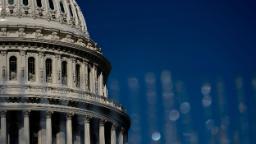[ad_1]

The proposal, spearheaded by Republican Sen. Susan Collins of Maine and Democratic Sen. Joe Manchin of West Virginia, would make clear that a vice president’s role in counting those votes is merely ceremonial. And it would make it harder for members of Congress to object to a state’s presidential results by requiring that one-fifth of the House and Senate mount objections — rather than just one House member and one senator.
A separate Senate bill, backed by five Republicans and seven Democrats, tries to combat ongoing threats to election administration by increasing federal penalties for anyone who threatens or intimidates election officials or tampers with voting systems.
Early Reaction
Additionally, the Senate version is unlikely to be the final word.
Will election deniers gain ground in more states?
Next week kicks off a new round of primary elections across the country, and upcoming editions of the CITIZEN newsletter will offer guides by CNN’s campaign team of the key races to watch each week.
Perhaps the biggest test of whether election denial has firmly taken root among the Republican faithful will come in Arizona’s August 2 primary.
Trump has endorsed several candidates in the Grand Canyon State who have embraced his baseless claims that widespread election fraud led to his 2020 defeat, including Republican gubernatorial candidate Kari Lake, secretary of state contender Mark Finchem and venture capitalist Blake Masters, who is vying to take on Democratic Sen. Mark Kelly in the general election.
At the local level in Arizona, meanwhile, a four-way race for a seat on the Maricopa County Board of Supervisors includes candidates who have advanced election conspiracy theories.
Biden captured Arizona by nearly 10,500 votes of out of more than 3 million cast statewide.
Whoever wins the Maricopa seat will serve until January 2025 and help oversee the 2024 presidential election in the county.
You need to read
- These stories in Reuters and The New York Times about new moves by conservative sheriffs’ organizations to investigate the conspiracy theory that the 2020 election was rigged against Trump. As Reuters notes, election officials fear that partisan probes into baseless allegations of election fraud will undermine public confidence in elections.
- CNN’s story on the busy month ahead of fact-finding and decision-making for the House select committee investigating the January 6, 2021, attack on the US Capitol. Cheney, the No. 2 lawmaker on the panel, told CNN’s Jake Tapper on “State of the Union” over the weekend that the committee could “contemplate a subpoena” for Virginia “Ginni” Thomas, a conservative activist and wife of Supreme Court Justice Clarence Thomas.
- This story by CNN’s Eric Bradner on how the GOP gubernatorial primary in Arizona has turned into a proxy war between Trump and his former vice president.
[ad_2]
